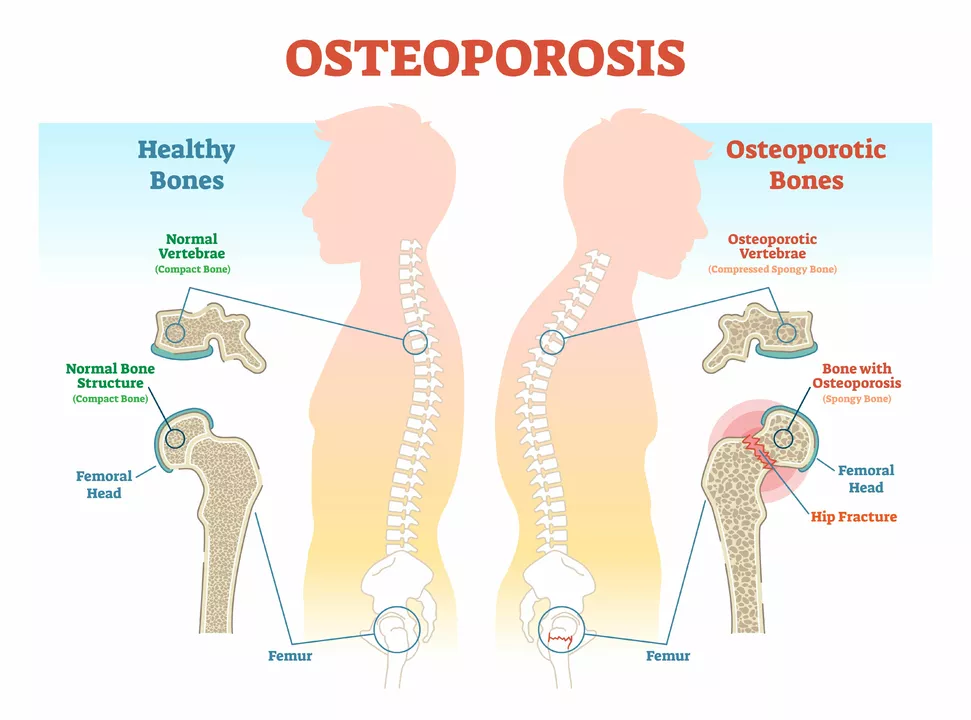Introduction to Bromocriptine and Bone Health
Bromocriptine is a medication that has been used for many years to treat a variety of conditions, such as Parkinson's disease, hyperprolactinemia, and type 2 diabetes. But did you know that bromocriptine might also have an impact on bone health? In this article, we will discuss the potential effects of bromocriptine on bone health, including its benefits and risks. We will also explore the latest research findings and provide some practical tips for maintaining strong and healthy bones.
The Role of Prolactin in Bone Health
Before we dive into the effects of bromocriptine on bone health, it's important to understand the role of prolactin in our bodies. Prolactin is a hormone produced by the pituitary gland, and its primary function is to stimulate milk production in women after childbirth. However, prolactin also plays a role in regulating bone turnover, which is the process of breaking down old bone and building new bone.
High levels of prolactin can have a negative impact on bone health, as they can lead to increased bone resorption (the breakdown of bone) and decreased bone formation. This can result in decreased bone density and an increased risk of osteoporosis and fractures. Bromocriptine, as a dopamine agonist, works by reducing the production of prolactin, which may help to improve bone health.
How Bromocriptine May Improve Bone Health
Several studies have shown that bromocriptine may have a positive effect on bone health. For example, one study found that bromocriptine treatment led to a significant increase in bone mineral density in patients with hyperprolactinemia. Another study found that bromocriptine treatment in postmenopausal women resulted in increased bone density and reduced bone turnover.
These findings suggest that bromocriptine may help to improve bone health by reducing prolactin levels and promoting a more balanced bone turnover process. This can lead to stronger bones and a reduced risk of fractures.
Long-term Effects of Bromocriptine on Bone Health
While short-term studies have shown promising results regarding the impact of bromocriptine on bone health, more research is needed to determine its long-term effects. Some studies have found that the beneficial effects of bromocriptine on bone health may diminish over time, while others have found that these effects can persist for several years.
Further research is needed to determine the optimal duration of bromocriptine treatment for maintaining bone health and preventing fractures.
Risks and Side Effects of Bromocriptine
Like all medications, bromocriptine can have side effects. The most common side effects of bromocriptine include nausea, dizziness, and headaches. In rare cases, bromocriptine can cause more serious side effects, such as hallucinations, heart problems, or severe allergic reactions.
It's important to discuss the potential risks and benefits of bromocriptine treatment with your healthcare provider to determine if it's the right option for you.
Bromocriptine and Other Medications for Bone Health
Bromocriptine is not the only medication that can have an impact on bone health. Other medications, such as bisphosphonates, hormone replacement therapy, and selective estrogen receptor modulators, can also help to improve bone density and reduce the risk of fractures. It's important to discuss your individual needs and risk factors with your healthcare provider to determine the best treatment plan for your bone health.
Preventing Bone Loss and Promoting Bone Health
While medications like bromocriptine can play a role in improving bone health, it's also important to focus on lifestyle factors that can help to prevent bone loss and promote strong, healthy bones. Some tips for maintaining good bone health include:
- Eating a balanced diet rich in calcium and vitamin D
- Engaging in regular weight-bearing exercise, such as walking, jogging, or weightlifting
- Avoiding smoking and excessive alcohol consumption
- Maintaining a healthy body weight
- Getting regular bone density screenings to monitor your bone health
Conclusion
In conclusion, bromocriptine has shown promise in improving bone health by reducing prolactin levels and promoting balanced bone turnover. However, more research is needed to determine its long-term effects on bone health and its optimal role in the prevention and treatment of osteoporosis and fractures. It's important to discuss your individual needs and risk factors with your healthcare provider to determine the best treatment plan for your bone health, and to focus on lifestyle factors that can help to maintain strong, healthy bones.

Richa Shukla
April 27, 2023 AT 21:18Chris Rowe
April 28, 2023 AT 15:19Sushmita S
April 29, 2023 AT 12:52Selma Cey
May 1, 2023 AT 12:25AnneMarie Carroll
May 3, 2023 AT 12:20John K
May 4, 2023 AT 22:56Laura Anderson
May 5, 2023 AT 07:37Avis Gilmer-McAlexander
May 5, 2023 AT 10:33Jerry Erot
May 6, 2023 AT 19:23Fay naf
May 7, 2023 AT 00:42ANTHONY SANCHEZ RAMOS
May 8, 2023 AT 11:21Matt Czyzewski
May 10, 2023 AT 05:10John Schmidt
May 10, 2023 AT 16:45Lucinda Harrowell
May 12, 2023 AT 00:08Francis Pascoe
May 12, 2023 AT 13:33